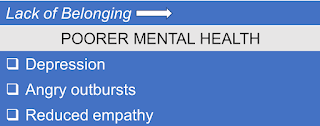A square peg in a round hole.
 Most of us have felt like that square peg at some point. In
a college class. In a high school club. Meeting up again with that group of
friends who has stayed close over the past years while you have drifted away.
The oldest person in the room. The youngest. We tried to enter that space but
discovered that we were not going to make it in through that round hole unless
someone whacked us very hard on top of our square peg head to cram us inside. If
we do make it inside, we will be a bit bruised – or maybe even find that some
of our edges have been shaved off. And so, we debate…how much do we really want
to be in that room? Is it worth the brutal passage? And once we are in, will
the bruises heal?
Most of us have felt like that square peg at some point. In
a college class. In a high school club. Meeting up again with that group of
friends who has stayed close over the past years while you have drifted away.
The oldest person in the room. The youngest. We tried to enter that space but
discovered that we were not going to make it in through that round hole unless
someone whacked us very hard on top of our square peg head to cram us inside. If
we do make it inside, we will be a bit bruised – or maybe even find that some
of our edges have been shaved off. And so, we debate…how much do we really want
to be in that room? Is it worth the brutal passage? And once we are in, will
the bruises heal?
 Engineering can be one of these round hole places. But we
want to see a greater diversity of people working in engineering – diverse in
thinking patterns, leadership styles, vision, perspective.
Engineering can be one of these round hole places. But we
want to see a greater diversity of people working in engineering – diverse in
thinking patterns, leadership styles, vision, perspective.This is good for individuals, but this is even better for the whole profession of engineering. For that reason, we are embarking on a large-scale study of the current state of the engineering workplace culture. We want to know who feels like they belong, who doesn’t, and why. And, we want to know more about how that sense of belonging comes alongside feelings of being competent and having some say-so in our daily work lives (autonomy). Hence the name of our study, Engineering CAReS: Engineering Competence Autonomy Relatedness (a.k.a. Belonging) Study.
From its beginning, the round hole that is engineering was closed to most types of pegs. Over the past 50 years, we have gradually invited more shapes of pegs to come in. But that hole is still very round. Anyone is welcome to enter, but they will often have to accept the many compromises that it takes to fit through – and live in – that round hole.
But does it have to be that way? What if the hole could be carved out to be square, instead? Or even made large enough to let the triangles and crescents fit through unscathed as well?The U.S. has spent decades trying to increase the diversity of people in engineering. Of course, most of those efforts focus on the pegs - how engineering can do a better job of shaving those square pegs into round ones. Our research team wants to flip that question around. How can we carve out engineering fields so that they form a new shape, one that allows more people to enter – and to stay – without needing to change their own shape?
Thanks for joining us in this journey to a new, and better, engineering future.
Are you interested in participating in this project by completing an online research survey?
Click here to read more about the survey.







No comments:
Post a Comment
Thanks for your comments. Posts will be visible after approved by the moderator.